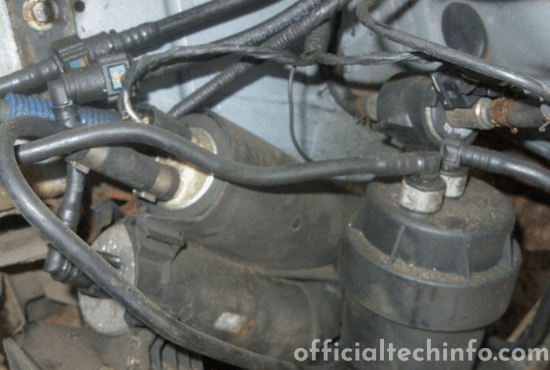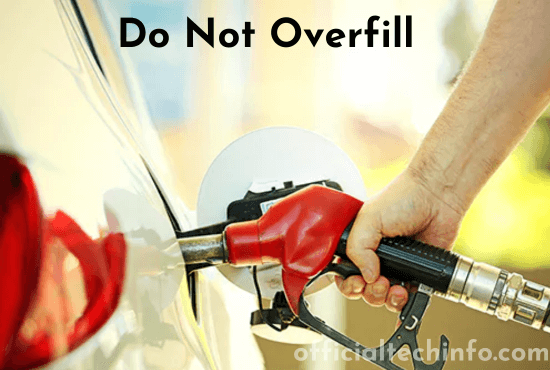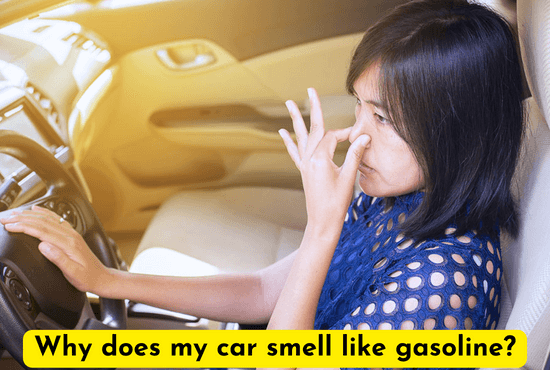Table of Contents
ToggleWhy does my car smell like gasoline?
You’re not alone if you’ve ever wondered, “Why does my car smell like gasoline?” A lot of people who own cars have this problem, and it can be irritating and dangerous. Now let’s explore the potential causes and solutions for that irritating gasoline smell in your car.
Why does my car AC smell like gasoline?
In most cases, a fuel leak will be indicated by the presence of a gasoline smell. Turning on the air conditioning or heater causes the fumes and odor to be drawn into the vehicle’s interior.
Inhaling gas fumes is just as dangerous as exhaust fumes. if you are worried Where Can I Sleep In My Car If I’m Homeless? then here is a complete guide to this problem.
Common Reasons for Gasoline Smell in Cars
Leaking Fuel System Components

A fuel leak is one of the most common causes of a gasoline smell. This can happen in the fuel tank, fuel lines, or injectors, and other places in the fuel system.
Fuel leaks can be harmful because they raise the possibility of an explosion or fire. It’s critical to take quick action if you detect a fuel leak.
Faulty Fuel Cap
When the fuel cap is missing, damaged, or loose, gasoline vapors can escape, creating that strong smell.
Maintaining the pressure inside the fuel tank and stopping vapor leaks are two important functions of the fuel cap. Make sure the fuel cap is properly tightened and in good condition.
Buy Now
Problems with the EVAP System
With the Evaporative Emission Control System (EVAP), fuel vapors from the gas tank are kept from escaping into the air.
If the EVAP system isn’t working properly, like if the charcoal canister is broken or if there’s a leak, then gasoline vapors will escape and the vehicle will smell like gasoline.
Fuel Tank Overfill

If you fill up your car’s gas tank too much, gasoline could leak out and get on the outside of the car.
Of course, this can make the area around the fuel filler neck smell strongly of gasoline. To keep this from happening, you must not overfill your tank.
Exhaust System Issues
Fuel smells inside the car can be due to issues with the exhaust system, like a broken catalytic converter or a leak.
Unburned gasoline fumes can enter the cabin through the vents if the exhaust system is leaking, which can cause a noticeable odor.
Diagnosing the Problem: Why do I smell gas in my car
If your car smells like gasoline, it’s essential to diagnose the problem correctly to take appropriate action. Here are some steps you can follow:
- Visual Inspection: Under the vehicle, around the fuel tank, and along the fuel lines should be checked for visible signs of fuel leaks.
- Check the Fuel Cap: Ensure the fuel cap is tight and in good condition. Replace it if it appears damaged or worn out.
- Monitor Fuel Consumption: If you notice a sudden drop in gas mileage, it could mean that there is a leak or something else wrong with the fuel system.
- Professional Inspection: If you can’t figure out where the smell is coming from, you should take your car to a professional mechanic. They can do a full inspection and figure out what the problem is really about.
Solutions for Addressing Gasoline Odor in Cars
Now that we’ve explored some common causes of gasoline smell in cars, let’s discuss potential solutions to address the issue:
- It is critical to have a professional mechanic check and fix any fuel system components—like fuel lines or injectors—that you suspect of leaking.
- Check the tightness and condition of your fuel cap. Think about getting a new one if it’s worn out or damaged.
- Seek the advice of an expert mechanic if you think there may be a problem with the evaporative emissions system. If there is a problem with the charcoal canister, hoses, or valves, they can fix it.
- To keep gasoline spills and smells at bay, don’t fill up your gas tank to the top.
- Have your exhaust system checked and fixed right away if you find any problems, like a leak or a broken catalytic converter, so gasoline smells don’t get into the cabin.
Related Posts
- Where Can I Work on My Car?
- Where Can I Work on My Car for Free or Cheap?
- Where to fix a small dent in my car Doral
- Is it worth fixing hail damage on a car?
Conclusion:
A gasoline smell in your car can be concerning, but by understanding the common causes behind it and taking proactive steps to address the issue, you can ensure a safer and more pleasant driving experience. If you’re unsure about the source of the odor or how to resolve it, don’t hesitate to consult with a professional mechanic for assistance.
FAQs
Why does my car smell like gas but isn’t leaking?
There is no gas leak, but my car has a gas smell. The fuel pressure regulator may be malfunctioning if this happens. Your car’s engine will burn fuel too rapidly if the fuel pressure regulator isn’t working properly, which will lead to an imbalanced fuel mixture.
How do you fix a gasoline smell in a car?
Apply a thick layer of baking soda to the impacted areas, including the floor mats and seats. The baking soda will soak up the smell if you let it sit for at least a few hours, preferably overnight. The next step is to remove the baking soda and any lingering odor by giving the area a good vacuuming.
Is the gasoline smell in my car dangerous?
While a gasoline smell in your car is usually more of an annoyance than a serious safety concern, it’s essential to address the underlying issue promptly. Gasoline fumes can be flammable and potentially harmful if inhaled in large quantities.
Can I continue driving my car if it smells like gasoline?
It’s generally not advisable to continue driving your car if you notice a strong gasoline odor inside the cabin. The presence of gasoline fumes could indicate a potential safety hazard, such as a fuel leak or other issues with the fuel system.
How can I prevent gasoline odors in my car?
Regular maintenance and inspections of your car’s fuel system, including checking for leaks and ensuring the fuel cap is properly tightened, can help prevent gasoline odors. Additionally, avoiding overfilling your fuel tank can reduce the risk of spills and associated odors.

